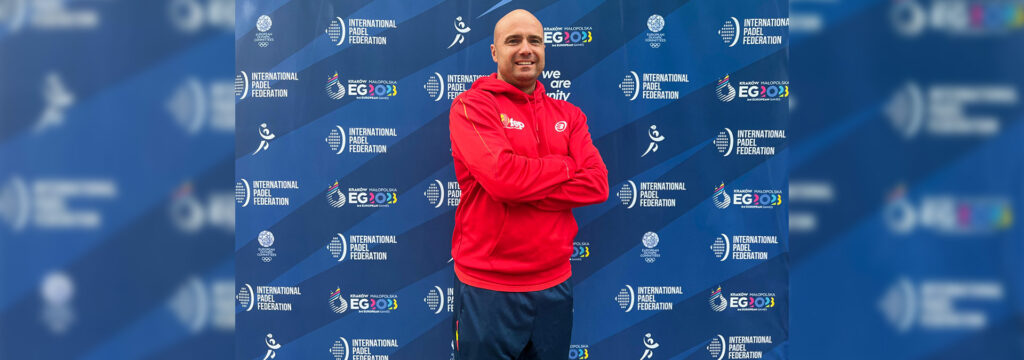Juanjo Gutierrez (Spain): “The secret? Training and technical basics. To the boys I say: “have fun”.
June 25, 2023
Recruitment, training, technical basics for the players. In these few words lies the secret of Spanish padel, a winning model worldwide. Explaining this during the ongoing European Games in Krakow, is Juanjo Gutierrez, head coach of the Spanish team. A character who has made the history of the sport, on and off the court. As a reference player for Iberian padel, he has a trophy cabinet full of national and international titles and has been the coach of the national team for more than four years. We asked him about the key to the success of the Spanish model.
“First of all, the difference between Spain and other countries is mainly in tradition and time: in our country padel has been played for many years and we have been able to build the organisation, the base, private clubs, coaches, academies. For some time now, we have also been involved in the training of children”. This is one of the keys that marks the difference between the level of Spanish players and others, and that is the training of ‘pure’ padel players from a very young age, as is the case with any other sport, while in other countries there is still a strong incidence of ‘ferrying’ from tennis.”I myself come from tennis, recalls Gutierrez, then I moved to padel, in my day it was like that. A child who starts now, on the other hand, finds in Spain a real school and a well-defined and organised path to follow in order to grow and improve”.
His latest ‘creatures’ in the very young representative team competing at EG2023, are the best expression of the Spanish school and of the latest generation, to the point that in Krakow to run for a medal there is David Gala, considered the best young talent of the moment, as is Santigosa, 19, who at the European Games is playing precisely with Gala: “Now I will tell you the story of David Gala, who is here playing at only 17 years old. We happen to see him on the court at the age of six and a half in a tournament organised by a foundation, where you win ‘packages’ of training,’ says the Spanish coach. We gave him a level test and didn’t think twice: ‘we’ll take this one now’, was the verdict, despite the fact that he was not yet the age of the other boys. He found himself training with those much older than him but that was never a problem, there was no reason not to start training him and now here he is, running to do well here in Krakow”.
Then of course, in addition to the organisation and the formidable technical architecture as is the tradition in Spanish sport, there is also another cornerstone: “Yes, he confirms, last but not least, the quantity of available courts makes the difference”.
An efficient network is therefore at the basis of Spain’s success in the sport. But it is not enough, Gutierrez continues, telling how technical refinement is at the basis of everything: “At the beginning we purify the technical gesture of the boy, because having a great physique or being a tactical phenomenon without knowing how to hit the ball perfectly is a limitation,’ Juanjo emphasises. ‘On the other hand, if we ask for a shot that serves to change the game tactically, the boy will only be able to repeat it if he is technically prepared. So the technical basis is fundamental, what happened in tennis we are replicating in padel”.
At the European Games, the spectacle of the semi-finals and finals mirrors a “balanced tournament: the matches are difficult and the level very tight. The details make the difference, in the end whoever is more ‘special’ wins. You play with the surface in one way, with the glass in another, so the pair that adapts best to the situation and can exploit their experience gets the better of the other‘.
The Spanish team had no minimum goals on the eve of the Krakow tournament: “We explained the meaning of this tournament well to the boys, which is not to win, get to the final or semifinals. Rather, to get them to play at this level. They are all under-23s,’ Gutierrez continued, ‘we must not put pressure on them. It is crucial that the players keep calm, don’t get nervous. The Spanish Federation has brought a very young team here, even with an under-18, but the athletes have already played in a highly competitive circuit in Spain, which is well structured. Because that kind of experience also counts a lot”. And judging by the way Spain dominates the scene, difficult to replicate.